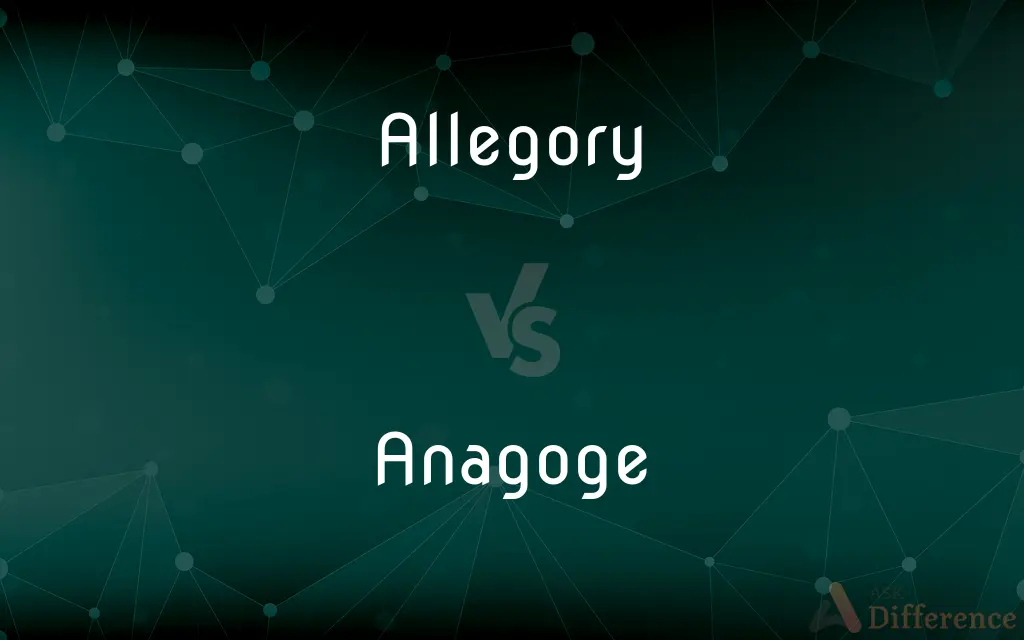Allegory vs. Anagoge — What's the Difference?

Difference Between Allegory and Anagoge
ADVERTISEMENT
Compare with Definitions
Allegory
As a literary device, an allegory is a narrative in which a character, place, or event is used to deliver a broader message about real-world issues and occurrences. Authors have used allegory throughout history in all forms of art to illustrate or convey complex ideas and concepts in ways that are comprehensible or striking to its viewers, readers, or listeners.
Anagoge
Anagoge (ἀναγωγή), sometimes spelled anagogy, is a Greek word suggesting a "climb" or "ascent" upwards. The anagogical is a method of mystical or spiritual interpretation of statements or events, especially scriptural exegesis, that detects allusions to the afterlife.Certain medieval theologians describe four methods of interpreting the scriptures: literal/historical, tropological, allegorical, and anagogical.
Allegory
A story, poem, or picture that can be interpreted to reveal a hidden meaning, typically a moral or political one
Pilgrim's Progress is an allegory of the spiritual journey
Anagoge
A mystical interpretation of a word, passage, or text, especially scriptural exegesis that detects allusions to heaven or the afterlife.
Allegory
The representation of abstract ideas or principles by characters, figures, or events in narrative, dramatic, or pictorial form.
ADVERTISEMENT
Anagoge
The spiritual or mystical interpretation of a word or passage beyond the literal, allegorical or moral sense (especially in Biblical criticism).
Allegory
A story, picture, or play employing such representation. John Bunyan's Pilgrim's Progress and Herman Melville's Moby-Dick are allegories.
Anagoge
An elevation of mind to things celestial.
Allegory
A symbolic representation
The blindfolded figure with scales is an allegory of justice.
Anagoge
The spiritual meaning or application; esp. the application of the types and allegories of the Old Testament to subjects of the New.
Allegory
(rhetoric) A narrative in which a character, place, or event is used to deliver a broader message about real-world issues and occurrences.
Anagoge
A mystical or allegorical interpretation (especially of Scripture)
Allegory
A picture, book, or other form of communication using such representation.
Anagoge
A mystical or allegorical interpretation (especially of Scripture)
Allegory
A symbolic representation which can be interpreted to reveal a hidden meaning, usually a moral or political one.
Allegory
A category that retains some of the structure of the category of binary relations between sets, representing a high-level generalisation of that category.
Allegory
A figurative sentence or discourse, in which the principal subject is described by another subject resembling it in its properties and circumstances. The real subject is thus kept out of view, and we are left to collect the intentions of the writer or speaker by the resemblance of the secondary to the primary subject.
Allegory
Anything which represents by suggestive resemblance; an emblem.
Allegory
A figure representation which has a meaning beyond notion directly conveyed by the object painted or sculptured.
Allegory
A short moral story (often with animal characters)
Allegory
A visible symbol representing an abstract idea
Allegory
An expressive style that uses fictional characters and events to describe some subject by suggestive resemblances; an extended metaphor
Share Your Discovery

Previous Comparison
Whole vs. Skim
Next Comparison
Etiquette vs. Protocol














































